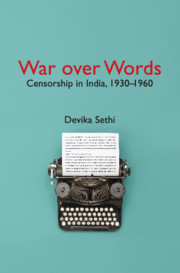Book contents
- Frontmatter
- Dedication
- Contents
- Acknowledgements
- List of Abbreviations
- Introduction
- Part I Guarding the State, Protecting the Public: Censorship Policies and Practices in the 1930s
- Part II Protests and Publicity: Banning Non-Indian Authors
- Part III Political or Military? Censorship in India during the Second World War
- Part IV The Censored Turn Censors: Freedom and Free Speech
- Conclusion
- Epilogue
- Bibliography
- Name Index
- General Index
Part II - Protests and Publicity: Banning Non-Indian Authors
Published online by Cambridge University Press: 26 April 2019
- Frontmatter
- Dedication
- Contents
- Acknowledgements
- List of Abbreviations
- Introduction
- Part I Guarding the State, Protecting the Public: Censorship Policies and Practices in the 1930s
- Part II Protests and Publicity: Banning Non-Indian Authors
- Part III Political or Military? Censorship in India during the Second World War
- Part IV The Censored Turn Censors: Freedom and Free Speech
- Conclusion
- Epilogue
- Bibliography
- Name Index
- General Index
Summary
In official circles in 20th-century colonial India, to ban or not to ban, that was the question. In a colonial context, and against the backdrop of an anti-colonial movement, it is all too easy to see censorship of publications operating along racial lines, and to assume that only publications by Indian authors were subject to censorship. However, non-Indian authors—former colonial officials and soldiers, journalists, missionaries and travellers—writing in English on matters concerning India commanded audiences in their home countries in addition to being read by an influential section of the Indian population. Precisely because they escaped colonial stereotyping about ‘seditious natives’, non-Indian authors’ words carried a greater illusion of neutrality, and sometimes more weight. It was one thing to ban books written by leaders and ideologues of anti-colonial movements and quite another to ban those written by well-known Western writers. The former could be justified as an administrative decision made in the interest of preserving law and order; the latter smacked of a cover-up. By reconstructing the question of—and the controversy over—the possible banning of such books by the colonial state in the 1920s–1930s, it becomes possible to question commonly held assumptions about the conduct of the censorship of publications in late colonial India.
Newspaper articles in contemporary India routinely dredge up lists of books banned by the colonial state, including many by foreign authors, but these lists are reproduced from official gazette notifications without any comment on—or understanding of—how they came to be banned in the first place. By examining debates within the state and in the public sphere about some of these banned books, Part II of this book seeks to complicate the easy association of censorship with race and nationality in a colonial context. What criteria did the colonial state use to decide if a book by a non-Indian author was worth banning? Was it the content of the book? Was it the political context in which it was published? Or did factors like the potential size of readership and range of circulation, popularity of the author, price of the book, or protests against it by the public also play a role?
- Type
- Chapter
- Information
- War over Words , pp. 59 - 62Publisher: Cambridge University PressPrint publication year: 2019



